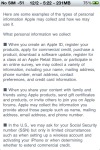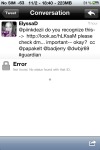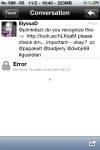Joseph K. Black
Social Media Experiment Gone Horribly Wrong
Mon Feb 28 04:46:25 CST 2011
Update: On October 31, 2011, Joseph K. Black was arrested by Nebraska police officers after a 35 minute car chase spanning four counties, during what was described as one of his psychotic episodes. For more details and the police reports, read all about it. In addition, a full criminal history on Black is available.
Given the inane amount of  babble to come from Joseph K. Black via Facebook and Twitter in late January of 2011, we’ll spare everyone a lot of the gory details and just post a few short examples of why Black will not only never obtain his dream job of National Cybersecurity Advisor, but will likely end up working the counter at a Runza near you some time in the near future, provided he doesn’t end up in prison.
babble to come from Joseph K. Black via Facebook and Twitter in late January of 2011, we’ll spare everyone a lot of the gory details and just post a few short examples of why Black will not only never obtain his dream job of National Cybersecurity Advisor, but will likely end up working the counter at a Runza near you some time in the near future, provided he doesn’t end up in prison.
Simply put, Black has designs on being appointed “National Cybersecurity Advisor” by the Obama administration. While that in itself may be an admirable goal, Black seems to think that self-promotion, being top 10 on search results and outlandish claims through social media outlets will help his cause more than, say, actual experience and contributions to the security industry (“cyber” or otherwise). Moving into February, his big thing became some fictional “megacommunity” (“Google it!” he says) with imaginary ties to every government agency, big service provider and anything else that he fancies.
With his inability to use Twitter and Facebook correctly, posting everything three or four times, he betrays the notion that he is an expert at anything. Because really, Twitter is hard to figure out. According to Black, he is the Ben Roethlisberger of Cybersecurity, the Governor of Cyberspace, the King of Cyberspace, the John Wayne of Cyberspace, the Michael Jordan of Cybersecurity, the Smokey the Bear of Cybersecurity, the Captain of the Cool Kids and a Cybersecurity ROCKSTAR! We could cite dozens of examples of his general idiocy here, but a short few should paint a clear picture of the level of e-tard we’re dealing with:




The @Gregory_D_Evans Twitter account summed it all up very nicely in one tweet:

It should be noted that before Black “went full retard” as mentioned above, Lyger did try to personally and privately contact Black twice via email to open a dialogue. Neither email was answered:
Date: Tue, 25 Jan 2011 10:56:38 -0600 (CST) From: lyger (lyger@attrition.org) To: j.black@blackbergsecurity.us Subject: Black & Berg intent Hi Joe, I've noticed over the past few days that you've mentioned Black & Berg over a few different social media outlets (most noticeably Twitter and Facebook). Some of the posts have been somewhat curious to say the least: http://www.facebook.com/cyberweapons/posts/149401075115575 http://twitter.com/JosephKBlack/statuses/29056293369020416 Since you apparently have various security industry certifications, I'm curious about your reasoning behind some of the comments I (as well as other professionals in the security industry) have seen. This isn't intended to be a criticism, just reaching out to see if your messages are intended to be serious, a marketing ploy, a mixture of both, or something else we haven't quite figured out yet.
Whether he’s just overzealous, delusional, a net-kook, or a simple troll, we’re done with him. Desperate and irrelevant, Black has had his 15 minutes of notoriety (not “fame”, as he probably thinks) and like all good trolls, his time too has passed. He isn’t relevant enough to include on Errata: Charlatan, so he ended up here, on Postal: Asshats.
*PLONK* .. we’ll leave you with this mess:












































Pingback: Tweets that mention Desperately seeking @ElyssaD: The power of Twitter | Moderately Marvelous — Topsy.com
Pingback: The Internet: Not just for funny cat videos any more : Post Politics: Political News and Views in Tennessee
Excellent post!!!!!!!!
I’d rather not specifically say, as it would merely be speculation. I have no doubt that she will tell us all about it eventually. But yes, we are all relieved that she is safe.
Thank you.
Pingback: Tweets that mention Desperately seeking @ElyssaD: The power of Twitter | Moderately Marvelous — Topsy.com